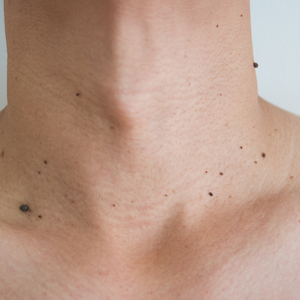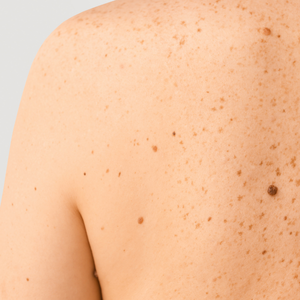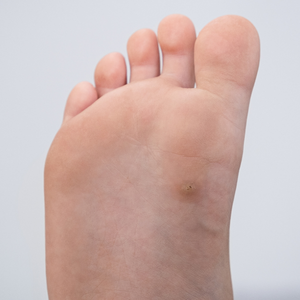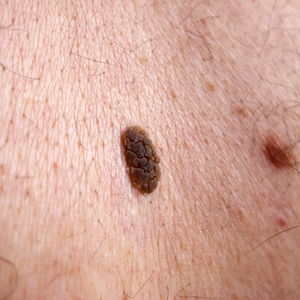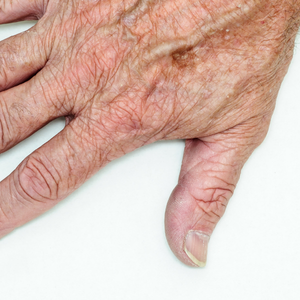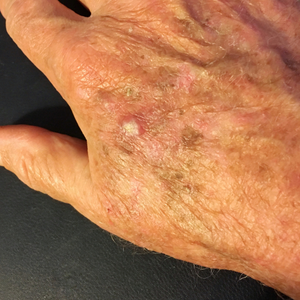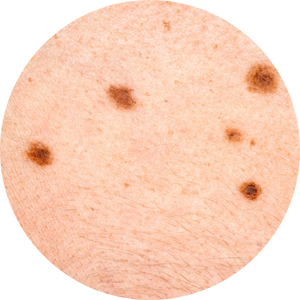
Expert Assessment & Removal: Addressing Skin Lesions with Confidence.
Skin lesions are common occurrences that can range from harmless growths like skin tags and moles to viral infections such as warts and verrucas. While many are benign, some can be a cause for concern, particularly those that may indicate skin cancer.
At SkinQure, Dr. Paul Charlson, a leading UK skin doctor with extensive experience, offers expert diagnosis and management for a wide array of skin lesions. His approach prioritises accurate identification and a tailored plan, ensuring both cosmetic concerns and potential health risks are addressed thoroughly.
Understanding Skin Tags, Moles, Warts, Verrucas & Other Lesions
These common skin growths and changes can arise from various factors:
-
Skin Tags (Acrochordons):
Small, benign growths that often appear in areas of friction, such as the neck, armpits, and groin. -
Moles (Naevi):
Common pigmented spots that can vary in colour, shape, and size. While most are benign, changes in a mole’s appearance can sometimes be a sign of skin cancer (melanoma or non-melanoma). -
Warts & Verrucas:
Caused by the Human Papillomavirus (HPV) and are contagious. Warts typically appear on the hands and other body areas, while verrucas are found on the soles of the feet. -
Seborrhoeic Keratoses:
Benign, often waxy or “stuck-on” looking growths that become more common with age. -
Solar Lentigines (Age Spots/Sun Spots):
Flat, brown spots that develop on sun-exposed areas due to UV damage. -
Actinic Keratoses:
Rough, scaly patches that develop on sun-damaged skin. These are considered pre-cancerous and can evolve into squamous cell carcinoma if left untreated.
Expert Dermatological Assessment and Management at SkinQure
At SkinQure, Dr. Charlson conducts thorough dermatological assessments to accurately diagnose the type of skin lesion you have. This precise diagnosis is crucial for developing an effective and individualised management plan.
Crucially, during your consultation, Dr. Charlson will carefully examine any suspicious lesions for signs of skin cancer. For those with multiple moles or a history of sun exposure, mole mapping may be recommended as a comprehensive way to monitor changes over time. Early detection of skin cancer, including melanoma, basal cell carcinoma, and squamous cell carcinoma, is vital for successful treatment. Paul provides Mole Checks using a dermatoscope.
His expertise encompasses a range of evidence-based strategies aimed at:
- ✓ Accurate diagnosis and differentiation of benign vs. potentially malignant lesions.
- ✓ Safe and effective removal options.
- ✓ Minimising scarring where possible.
- ✓ Providing clear guidance on monitoring skin health.
During a detailed consultation, Dr. Charlson will evaluate your specific concerns, discuss the nature of your lesions, and recommend the most appropriate approach for your condition and peace of mind.
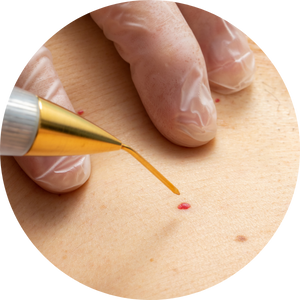
Treatment
A range of safe and effective treatments are available for various skin lesions, often chosen based on the type, size, location, and nature of the lesion (benign vs. suspicious). These may include:
- Cryotherapy: Freezing lesions with liquid nitrogen to destroy the tissue. This is commonly used for warts, verrucas, actinic keratoses, and some benign lesions.
- Excision (Surgical Removal): For moles, suspicious lesions, or larger benign growths, surgical excision involves cutting out the lesion. This allows for laboratory analysis (histology) to confirm the diagnosis, particularly vital when skin cancer is suspected.
- Shave Excision: A technique where a lesion is “shaved” off the skin’s surface using a scalpel. Often used for raised moles, skin tags, and seborrhoeic keratoses.
- Curettage and Cautery: Involves scraping away the lesion with a curette and then using heat (cautery) to stop bleeding and destroy any remaining tissue. Used for certain benign lesions and some superficial skin cancers.
- Laser Therapy: Specific lasers can be used to treat certain pigmented lesions (like solar lentigines), vascular lesions (cherry angiomas), or to reduce the size of some moles.
- Topical Medications: Certain creams or solutions may be prescribed for specific conditions like warts or actinic keratoses.
Schedule a Consultation
If you are concerned about any new or changing skin lesions, wish to have existing skin tags, moles, warts, or verrucas assessed, or are interested in mole mapping for comprehensive skin monitoring, we strongly encourage you to schedule a consultation with Dr. Paul Charlson at SkinQure for expert dermatological evaluation and personalised management strategies. Early assessment is key for peace of mind, especially concerning skin cancer.

